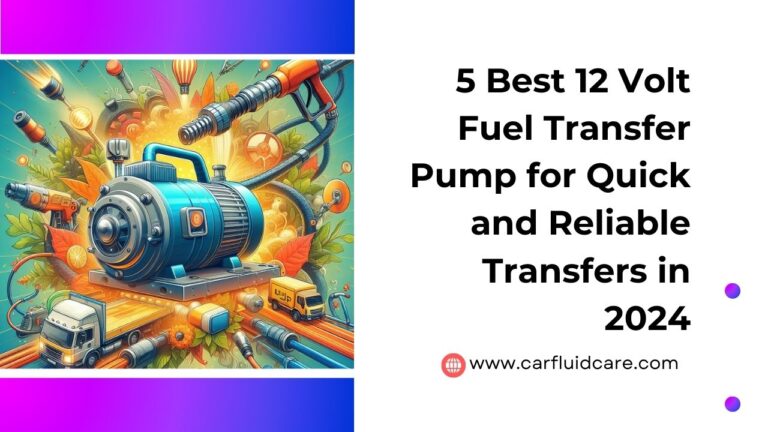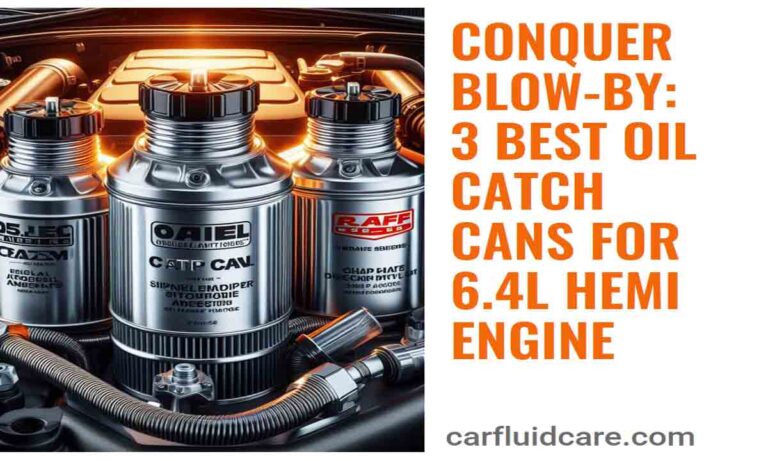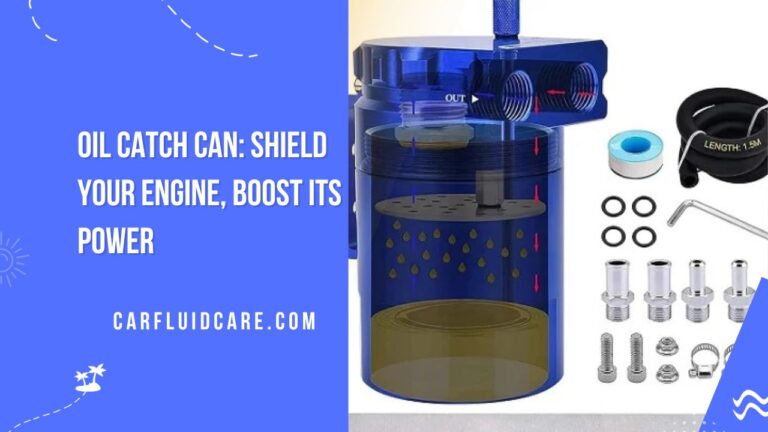Unveiling the Top 8 Friction Modifier Additives for Optimal Performance

In the intricate world of lubrication, friction modifiers act as key enablers, fostering smoother interactions between moving parts and minimizing energy losses associated with friction.
The primary objective of friction modifier additives is to modify the tribological properties of lubricants, promoting a more efficient transfer of energy and reducing the resistance encountered during relative motion. This results in improved fuel efficiency, reduced heat generation, and enhanced overall operational reliability. Friction modifiers achieve these outcomes by forming a protective layer on metal surfaces, altering the surface chemistry to facilitate smoother sliding and rolling movements.
What Is A Friction Modifier- Friction Modifier Definition
A friction modifier is a special type of additive mixed into lubricants like engine oil or transmission fluid to reduce friction and wear between moving parts in machinery.
They’re particularly important in scenarios where there’s light contact between metal surfaces, such as sliding or rolling motion.
How Do They Work?
Friction modifiers are typically amphiphilic molecules, meaning they have a polar “head” that attracts to metal surfaces and a non-polar “tail” that blends with the lubricant.
These molecules deposit themselves on metal surfaces, forming a thin protective layer that acts as a buffer between the surfaces. This layer reduces direct contact and minimizes friction, ultimately protecting parts from wear and tear.
Types of Friction Modifier Additive
Depending on the type of friction modifier, it can work in different ways:
- Organic friction modifiers (OFMs): These are common in engine oils and adsorb onto metal surfaces, forming a smooth, incompressible film.
- Oil-soluble organomolybdenum additives: These activate under high pressure and temperature, reacting with the metal surface to form a protective molybdenum disulfide (MoS2) layer.
- Functionalized polymers: These polymers create a boundary film on surfaces, reducing friction and wear.
- Dispersed nanoparticles: These tiny particles fill microscopic surface irregularities, preventing direct contact and lowering friction.
Friction Modifier Additive Benefits And Uses
Here are some benefits of friction modifier additives:
- Reduced Friction: Friction modifiers are primarily used to reduce friction between moving surfaces.
- Improved Fuel Efficiency: Reducing friction means less energy is wasted in overcoming resistance, leading to improved fuel efficiency.
- Wear Protection: Friction modifiers contribute to wear protection by forming a protective film or boundary layer on the surfaces of moving components.
- Extended Equipment Life: By minimizing wear and reducing friction, the use of friction modifier additives can contribute to extending the overall lifespan.
- Temperature Stability: Some friction modifiers also provide stability at high temperatures.
- Improved Cold Start Performance: Friction modifiers can enhance the lubricating properties of oils at low temperatures,.
- Enhanced Anti-Wear Properties: In addition to reducing friction, friction modifiers often exhibit anti-wear properties.
Applications
- Reduces friction between moving parts
- Improves fuel efficiency in engines by reducing internal friction
- Extends the lifespan of mechanical components by minimizing wear and tear
- Enhances performance in automotive transmissions and differentials
- Reduces heat generation in machinery
- Prevents metal-to-metal contact, minimizing damage
- Enhances overall lubrication effectiveness
- Used in various industries, including automotive, manufacturing, and aerospace
Read More A Comprehensive Guide To Engine Oil Sludge Removal
Best Friction Modifier Additive
Here’s a table summarizing the main features of the friction modifier additives:
| Friction Modifier Additive | Main Features | Check Price |
| Mopar Limited Slip Additive | – Precision Engineering – Wear Reduction – Noise Control | Check Price |
| Red Line 75w90 Gear Oil | – Racing-Grade Performance – Exceeds API GL-5 – Versatile Application | Check Price |
| Lubegard Dr. Tranny Instant Shudder Fixx | – Targeted Shudder Elimination – Reduced Wear – Universal Compatibility | Check Price |
| Red Line 80301 Limited Slip Friction Modifier | – High-Performance Formula – Friction Modification – Improved Wear Protection | Check Price |
| Ford Genuine Fluid XL-3 Friction Modifier Additive | – Tailored for Limited-Slip Differentials – Chatter Reduction – Hypoid Gear Noise Control | Check Price |
| CRC Trans-X Gear Oil Additive | – Gear Oil Additive for Limited Slip Differentials – Enhances Lubrication – Reduces Friction | Check Price |
| Mobil Delvac Limited Slip Gear Oil | – Specialized Gear Oil – Friction Modifiers for Limited Slip Differentials | Check Price |
| LUBEGARD Limited-Slip Supplement | – Top-Rated Additive – Enhances Limited-Slip Differential Performance | Check Price |
1. Mopar Friction Modifier: Genuine Mopar 4318060AB Additive
Upgrade your driving experience with the Genuine Mopar Fluid 4318060AB Limited Slip Additive. This 4 oz. bottle is a testament to Mopar’s commitment to quality, ensuring a factory-fit part that seamlessly integrates with your Dodge or Mopar vehicle.
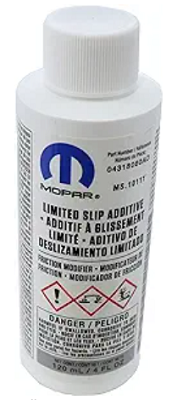
Features
- Precision Engineering: This limited slip additive is engineered to meet OEM specifications, guaranteeing a perfect fit and optimal performance for your vehicle.
- Wear Reduction: Experience extended lifespan for your limited slip differentials as the additive effectively reduces wear, promoting longevity and durability.
- Noise and Chatter Control: Say goodbye to annoying noises and disruptive chatter in your vehicle’s limited slip operation, creating a quieter and more enjoyable ride.
Applications
Ideal for Dodge and Mopar vehicles equipped with limited slip differentials, including models featuring Sure-Grip, Trak-Lok, and Power-Lok systems.
Pros
- Enjoy improved performance and responsiveness from your limited slip differentials.
- Reduce wear and tear, promoting a longer lifespan for critical components.
- Eliminate bothersome noises and chatter for a more serene driving experience.
- Genuine Mopar Fluid guarantees a perfect fit, ensuring compatibility with your vehicle’s specifications.
Cons
- Size limitation
How Do You Use A Mopar Limited Slip Additive?
Here’s a general guide on how to use Mopar Limited Slip Additive:
- Locate the Differential Fill Plug: Locate the fill plug on the differential housing.
- Prepare the Vehicle: Park the vehicle on a level surface.
- Remove the Fill Plug: Use the appropriate socket or wrench to loosen and remove the differential fill plug.
- Check Fluid Level: If it’s low, you may need to add some gear oil until it reaches the recommended level.
- Add Mopar Limited Slip Additive: Using a funnel, pour the recommended amount of Mopar Limited Slip Additive.
- Replace Fill Plug: Once you’ve added the additive, replace and tighten the fill plug securely.
- Test Drive: Take the vehicle for a short test drive to allow the additive to distribute throughout the differential.
2. Redline 75w90 Gear Oil: Red Line 57904 Synthetic Oil
Unleash the power of your drivetrain with Red Line 57904 (75W90) Synthetic Gear Oil – a high-performance lubricant.. This 1 Quart bottle of synthetic gear oil is a testament to Red Line’s dedication to delivering top-tier drivetrain lubrication.

Features
- Versatile Application: Ideal for both car and light truck differentials, this 75W90 Synthetic Gear Oil is a go-to choice for conventional and limited-slip differentials.
- Racing-Grade Performance: Preferred in most racing applications, the oil boasts exceptional frictional properties and contains a recommended friction modifier for limited-slip units.
- Transmission and Transaxle Use: While suitable for various differentials, this gear oil is also compatible with many transmissions and transaxles, offering flexibility in application.
- Exceeds API GL-5: Red Line goes above and beyond industry standards, ensuring that their Synthetic Gear Oil surpasses the requirements set by API GL-5 for superior quality and performance.
- Polyol Ester Basestocks: Crafted with polyol ester basestocks, the oil provides excellent lubrication even under extreme conditions of high-loading and high-temperatures.
- Natural Lubricity: The inherent slipperiness of the basestocks reduces sliding friction in hypoid gears, mitigating wear and maintaining optimal temperatures.
Applications
- Differential lubrication in passenger automotive vehicles
- Differential lubrication in commercial vehicles
- Preferred choice for racing applications
- Compatible with various transmissions and transaxles
Pros
- Provides the highest degree of protection for your drivetrain, ensuring longevity and reliability.
- Tailored for racing applications, offering superior frictional properties and a recommended friction modifier for limited-slip units.
- Optimized for use over a broad range of temperatures, making it suitable for diverse driving conditions.
- Versatile application in differentials, transmissions, and transaxles adds to its overall value.
- Maintains stable viscosity even during extended use, reducing the need for frequent oil changes.
Cons
- Price: High-performance comes at a cost, making it a premium choice in the market.
Read Also 7 Surprising Engine Oil Treatment Benefits
What Is 75w90 Gear Oil Used For?
- Transmission and Gear Applications: Used in manual transmissions, differentials, and gearboxes.
- Temperature Range: Suitable for both high and low-temperature conditions.
- Protection: Provides wear protection and enhances gear efficiency.
- Automotive and Industrial: Commonly used in automotive and industrial applications.
3. Lubegard Friction Modifier: Lubegard 19610 Dr. Tranny Instant Shudder Fixx
This concentrated friction modifier is meticulously formulated to provide an instant solution for torque converter lock-up shudder, ensuring a seamless driving experience.
Trusted by professional transmission technicians, this product has earned its reputation as the top choice for eliminating transmission shudder problems on the spot.
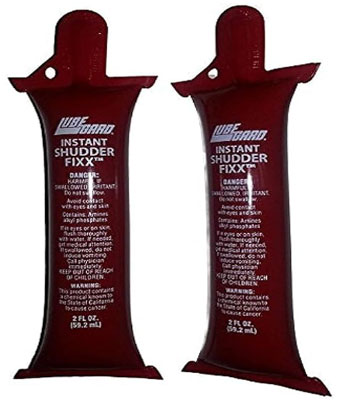
Features
- Targeted Shudder Elimination: Lubegard Instant Shudder Fixx is a five-time concentrated friction modifier designed specifically for the immediate elimination of transmission shudder issues.
- Reduced Wear: Enjoy peace of mind knowing that this formula provides four times less wear than regular ATF, extending the lifespan of your transmission.
- Universal Compatibility: Suitable for use with any automatic transmission fluid, excluding Ford Type F or CVT applications, making it a versatile solution for a wide range of vehicles.
- Professional Approval: Voted the top product by transmission professionals, Lubegard Instant Shudder Fixx is a trusted solution in the automotive industry.
Applications
Compatible with all conventional or synthetic automatic transmission fluids, Lubegard Instant Shudder Fixx is ideal for addressing torque converter lock-up shudder in various vehicles.
Pros
- Experience instant relief from transmission shudder problems with this concentrated friction modifier.
- The formula’s ability to provide four times less wear than regular ATF contributes to a longer lifespan for your transmission.
- Voted as the top product by transmission professionals, indicating its efficacy and reliability.
- Suitable for use with all conventional or synthetic automatic transmission fluids.
- The straightforward application process.
Cons
- Lubegard Instant Shudder Fixx is not suitable for use in Ford Type F or CVT applications.
Do I Need Friction Modifier?
Friction modifier is necessary for certain limited-slip differentials to prevent chatter and ensure smooth operation. However, for standard differentials, it may not be required.
What Does A Friction Modifier Do?
A friction modifier reduces friction between surfaces, commonly used in lubricants. It improves efficiency, minimizes wear, and enhances performance in various applications, such as automotive engines and industrial machinery.
How Much Friction Modifier To Use?
typically use 4% friction modifier (equivalent to one 4 oz. bottle). For the break-in of new differentials, use 4 to 8%.
Friction Modifier Oil
Friction modifier oil reduces friction between moving parts in machinery, enhancing efficiency and longevity. It is added to lubricants to improve performance and reduce wear in various industrial applications.
Friction Modifier In Engine Oil
Friction modifiers in engine oil reduce friction between moving parts, enhancing fuel efficiency and engine performance. They form a protective layer, minimizing wear and improving overall engine longevity.
What Is Limited Slip Friction Modifier?
A limited slip friction modifier is an additive used in differential gear oils to enhance lubrication and reduce friction in limited slip or positraction differentials.
Best Limited Slip Differential Additive
LUBEGARD® Limited-Slip Supplement is a top-rated additive for enhancing limited-slip differential performance, reducing friction, and providing optimal protection for your vehicle’s drivetrain.
4. Gm Limited Slip Differential Additive: Genuine Gm Fluid 88900330 Limited Slip
Discover the key to a smoother, quieter ride with Genuine GM Fluid 88900330 Limited Slip Axle Lubricant Additive. this 4 oz. powerhouse is a must-have for passenger car enthusiasts with limited-slip axles.

Features
- Friction Reduction: Experience improved efficiency and reduced wear and tear as this additive effectively minimizes friction within your vehicle’s limited-slip axle system.
- Noise Quieting: Bid farewell to bothersome rear axle noises, as this lubricant additive works to create a quieter and more enjoyable driving environment.
- Passenger Car Essential: Tailored for passenger cars, this additive is designed to meet the unique demands of limited-slip axles in these vehicles.
- Service Manual Guidance: Ensure proper application by consulting your vehicle’s service manual for specific instructions and recommendations.
Applications
Suitable for a range of passenger cars equipped with limited-slip axles, this lubricant additive is the ideal solution for drivers seeking optimal performance and a quieter ride.
Pros
- Reduces friction, leading to improved overall efficiency and longevity of the limited-slip axle system.
- Effectively eliminates rear axle noise, providing a more pleasant and peaceful driving experience.
- Specifically formulated for passenger cars, ensuring compatibility and optimum performance in this vehicle category.
- Suitable for a variety of driving scenarios, from daily commuting to more spirited drives.
Cons
- Quantity Limitation
5. Ford Genuine Fluid XL-3 Friction Modifier Additive
Introducing the Ford Genuine Fluid XL-3 Friction Modifier Additive – a powerful solution designed to enhance your driving experience. Crafted with precision and authenticity, this 4 oz. bottle is formulated to meet the high standards set by Ford.
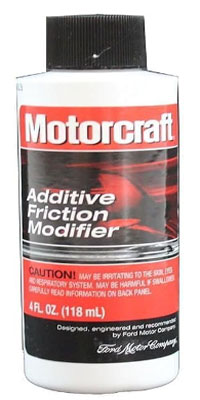
Features
- Tailored for Limited-Slip Differentials: Specifically engineered for use on certain limited-slip differentials, the XL-3 Friction Modifier targets and mitigates unwanted chatter and hypoid gear noise levels.
- Automotive-Grade Formulation: Meticulously crafted for automotive use, this friction modifier is not just a generic solution but a genuine Ford Fluid, guaranteeing compatibility and performance excellence.
- Surface Friction Reduction: By reducing the surface friction of lubricated parts, the XL-3 Friction Modifier enhances the efficiency of the lubrication process.
Applications
Ideal for vehicles equipped with limited-slip differentials, the Ford Genuine Fluid XL-3 is the go-to solution for those seeking to minimize chatter and hypoid gear noise levels.
Pros
- Effectively minimizes chatter and hypoid gear noise, providing a quieter and more comfortable driving experience.
- Designed to be used according to the owner’s guide recommendations.
- the XL-3 Friction Modifier guarantees quality and compatibility with your vehicle.
- Reduces surface friction on lubricated parts.
Cons
- Limited Application
What Is The Additive For Limited Slip Differential?
CRC Trans-X® is a gear oil additive designed for limited slip differentials. It enhances lubrication, reduces friction, and helps maintain optimal performance in such systems.
Which Lubricants Are Used In A Limited Slip Differential?
Limited slip differentials often require special gear oil with friction modifiers. Mobil Delvac is a popular choice, providing the necessary lubrication and friction characteristics for optimal performance.
How Does Gm Posi Work?
GM Posi, or limited-slip differential, uses clutches to transfer power between wheels. When one wheel slips, the clutches engage, allowing power distribution for better traction.
How Much Limited Slip Additive Do I Add?
For limited slip differentials, typically, you’d add 4 to 6 fluid ounces of limited slip additive per quart of gear oil.
Mopar Limited Slip Additive Equivalent
Mopar limited slip additive equivalents for GM ACDelco and Ford Motorcraft are typically compatible, but it’s recommended to check product specifications.
What Happens If You Don’t Add Limited Slip Additive?
If you don’t add the required limited slip additive to the gear oil in a differential that calls for it, several issues may arise:
- Increased Friction and Noise
- Chattering or Grabbing
- Overheating and Wear
- Reduced Effectiveness of Limited Slip Differential
Can You Add Too Much Limited Slip Additive?
Adding too much limited slip additive can lead to over-saturation, causing performance issues.
Is Limited Slip Differential Good?
Yes, a Limited Slip Differential (LSD) is beneficial for improved traction and stability in various driving conditions, providing better performance and handling.
What Does Limited Slip Differential Additive Do?
Limited Slip Differential enhance grip and prevent wheel slip, resulting in better traction and more balanced power distribution.
6. Friction Modifier Ford: Ford Genuine Fluid Xl-3 Friction Modifier Additive
The XL-3 Friction Modifier stands out with its specialized formula designed to be seamlessly integrated into lubricants. By significantly reducing surface friction on lubricated parts, it plays a crucial role in optimizing the performance of limited-slip differentials.
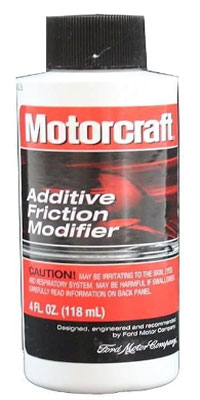
Features
- Tailored for Limited-Slip Differentials: The XL-3 Friction Modifier is expertly formulated to address the unique needs of limited-slip differentials, promoting smoother operation.
- Chatter Reduction: Say goodbye to annoying chatter! This additive is engineered to reduce chatter, ensuring a quieter and more comfortable ride.
- Hypoid Gear Noise Control: Experience reduced hypoid gear noise levels, enhancing overall driving comfort and providing a more enjoyable journey.
- Owner Guide Compatibility: Designed for hassle-free use, simply follow your vehicle’s owner guide recommendations for optimal application.
- Automotive-Grade Formula: Trust in the quality of a product specifically formulated for automotive use, meeting stringent standards to deliver exceptional performance.
Applications
Whether you’re navigating city streets or tackling off-road adventures, the XL-3 Friction Modifier is your go-to solution for minimizing chatter and hypoid gear noise levels.
Pros
- Experience a smoother and quieter ride, thanks to reduced chatter and gear noise.
- Crafted specifically for automotive use, adhering to the highest standards of quality and performance.
- Follow the owner guide recommendations for a straightforward and user-friendly application process.
- Suitable for use in a variety of limited-slip differentials, ensuring broad compatibility with different vehicle models.
Cons
- The XL-3 Friction Modifier is tailored for use in certain limited-slip differentials, limiting its application to specific vehicles.
7. Friction Modifier Transmission: Lucas 10009 Transmission Fix
Revitalize your vehicle’s transmission with Lucas Oil Transmission Fix, the unrivaled additive designed to tackle the #1 transmission problems effortlessly. Ideal for a wide range of vehicles, including motor homes and commercial fleets.

Features
- No Drain Required: With its innovative formulation, this additive can be added to your transmission without the need for draining any existing fluid, making maintenance a breeze.
- Extended Protection: Enjoy extended protection for planetary gears, reducing the likelihood of wear and tear over time.
- Fluid Life Extension: Reduces the need for frequent fluid changes, extending the life of your transmission fluid up to four times longer.
- Versatile Application: Suitable for use in any transmission, this product serves as both a remedy for existing issues and a preventative maintenance measure.
- Seal Leak Elimination: Lucas Transmission Fix actively eliminates most seal leaks, preventing fluid loss and promoting a reliable transmission system.
Applications
Ideal for worn transmissions experiencing slips, hesitation, or rough shifting.
Pros
- Seamless application without the need for draining existing fluid.
- Effective in addressing a high percentage of transmission issues.
- Extends protection to planetary gears for enhanced durability.
- Reduces the frequency of fluid changes, saving time and money.
- Suitable for a wide range of vehicles, from personal cars to commercial fleets.
Cons
- While effective in many cases, some extreme transmission issues may require professional intervention.
What Is The Purpose Of Friction Modifier?
- Reduces friction between surfaces
- Enhances lubrication efficiency
- Improves fuel efficiency
- Prevents wear and tear
- Minimizes heat generation
- Enhances overall performance of mechanical systems
What Is An Example Of A Friction Modifier?
Organic friction modifiers:
Example: Oleic acid derivatives
Oil-soluble organo-molybdenum additives:
Example: Molybdenum dithiocarbamate compounds
Read More About Rear Differential Fluid: Types, Color, Changing Interval & More
Why Are Transmission Fluids Often Mixed With Friction Modifiers?
Transmission fluids are often mixed with friction modifiers to enhance lubrication and reduce friction between moving parts. These additives improve the overall performance and longevity of the transmission by minimizing wear and heat generation.
What Type Of Fluid Is Highly Friction Modified?
Highly Friction Modified (HFM)-style fluids are typically specialized lubricants designed to reduce friction in various mechanical systems, enhancing performance and efficiency.
Friction Modifier For Differential
A friction modifier for differentials is an additive that reduces friction between gear surfaces, improving lubrication and enhancing performance in vehicles with limited-slip differentials.
How To Add Friction Modifier To Differential
Here’s a general guide on how to add a friction modifier to a differential:
Step 1: Identify the Differential Type
Determine whether your vehicle has a limited-slip differential or an open (standard) differential. Limited-slip differentials usually require a friction modifier.
Step 2: Raise the Vehicle
Safely lift the vehicle using a jack and secure it with jack stands or use a car lift if available. Make sure the vehicle is stable and secure.
Step 3: Locate the Differential
The differential is typically located at the rear or front of the vehicle, depending on whether it’s a rear-wheel-drive or front-wheel-drive vehicle.
Step 4: Drain the Differential Fluid
If the differential fluid needs to be changed, locate the drain plug and use a wrench or socket set to remove it. Allow the fluid to drain into a suitable container.
Step 5: Add Friction Modifier
After draining the old fluid, if necessary, add the recommended amount of friction modifier to the differential.
Step 6: Fill with Differential Fluid
If you’ve drained the differential fluid, replace the drain plug and use a funnel to fill the differential with the appropriate type and amount.
Step 7: Replace the Fill Plug
Once the fluid is at the correct level, replace the fill plug and tighten it securely.
Step 8: Check for Leaks
Start the vehicle and let it run for a few minutes. Check for leaks around the differential.
8. Limited Slip Friction Modifier: Red Line 80301 Friction Modifier
Is your vehicle struggling with limited slip differential issues? Look no further than the Red Line 80301 Limited Slip Friction Modifier, a game-changer in the automotive world.
This 4 oz bottle packs a punch when it comes to improving your vehicle’s performance and longevity.

Features
- High-Performance Formula: The 80301 is crafted with a high-performance formula that ensures maximum effectiveness in limited slip differentials.
- Friction Modification: Say goodbye to unwanted noise and vibration. This friction modifier minimizes chatter and ensures smooth, quiet operation of your vehicle’s limited slip differential.
- Improved Wear Protection: Protect your investment with enhanced wear protection. The friction modifier safeguards your differential components, prolonging their lifespan.
Applications
The Red Line 80301 Limited Slip Friction Modifier is ideal for various applications, including but not limited to:
- Sports cars
- Off-road vehicles
- Trucks
- Performance vehicles
- Daily commuters with limited slip differentials
Pros
- Experience a smoother and quieter ride with reduced chatter in your limited slip differential.
- The friction modifier improves the efficiency of your vehicle’s drivetrain, leading to better overall performance.
- Protect your differential components from wear and tear, ensuring a longer lifespan for crucial parts.
- Suitable for a wide range of vehicles.
Cons
- The 4 oz bottle might be considered small for those with larger differentials or multiple vehicles.
Differential Additive For Noisy
Limslip additive enhances stability in noisy differential systems, minimizing error and improving overall performance by mitigating the impact of disturbances.
How Do You Remove Differential Noise?
- Identify the source: Determine if the noise is coming from the differential.
- Check fluid levels: Ensure proper lubrication in the differential.
- Inspect for leaks: Leaking fluid may indicate a problem.
- Tighten bolts: Loose bolts can contribute to noise; check and tighten as needed.
- Replace worn bearings: Worn bearings can cause noise; replace them if necessary.
- Address gear issues: Damaged gears may need to be repaired or replaced.
What Oil To Use In A Noisy Differential?
Use an Extreme Pressure (EP) gear oil to reduce noise in a differential. Ensure it meets the manufacturer’s specifications.
Can Bad Differential Fluid Cause Noise?
Yes, bad differential fluid can cause noise due to increased friction and wear, leading to poor lubrication and performance issues.
Can You Use Lucas Oil Stabilizer In A Noisy Differential?
Yes, Lucas Oil Stabilizer can be used in a noisy differential to reduce friction and enhance lubrication for smoother operation.
Why Do I Need A Friction Modifier?
A friction modifier is essential in some lubricants to reduce friction and wear in mechanical systems, improving efficiency and extending the lifespan of components.
Is Friction Modifier Good For Transmission?
Friction modifiers can be beneficial for transmissions as they reduce friction between moving parts, improving efficiency and extending the lifespan of the transmission components.
What Is A Friction Modifier In Power Steering?
A friction modifier in power steering reduces friction between moving parts, enhancing smooth operation and reducing wear in the system, leading to improved performance and longevity.
How Do You Calculate Gear Differential?
To calculate gear differential, divide the number of teeth in the ring gear by the number of teeth in the pinion gear. This ratio determines the gear differential.
FAQs
Is friction modifier the same as limited slip?
No, friction modifier and limited slip are not the same. Friction modifier is an additive, while limited slip refers to a type of differential that provides variable torque distribution.
Who is Afton owned by?
Afton Chemical Corporation is a subsidiary of NewMarket Corporation.
What is the previous name of Afton Chemical?
The previous name of Afton Chemical was Ethyl Petroleum Additives.
What does Afton chemical make?
Afton Chemical specializes in developing and manufacturing petroleum additives, including engine oil additives. They create products to enhance the performance and efficiency of lubricants in various applications.
What is the mission of Afton Chemical?
Afton Chemical’s mission is to deliver innovative and sustainable solutions for the lubricant and fuel industries, enhancing performance, efficiency, and environmental responsibility.

Conclusion
Among the top friction modifier additives, products like Mopar Limited Slip Additive, Redline 75w90 Gear Oil, Lubegard Dr. Tranny Instant Shudder Fixx, and Ford Genuine Fluid XL-3 Friction Modifier Additive stand out for their precision engineering, wear reduction, noise control, and automotive-grade formulations.
These additives cater to specific needs, such as reducing chatter, minimizing hypoid gear noise, and ensuring smoother operation in limited-slip differentials.
